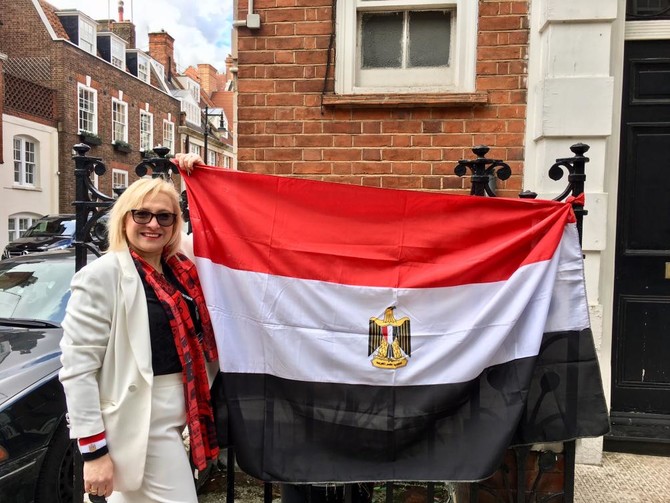LONDON: Sentiment was overwhelmingly in favor of President Abdel Fattah El-Sisi outside the Egyptian Embassy in London Friday morning as expatriates turned out to cast their vote in the country’s forthcoming election.
Supporters chanted their backing and tied the national flag to railings outside the embassy in Mayfair as overseas voting got underway at 9 a.m.
“Everyone here supports El-Sisi,” said political activist Sohaib Amr. “But regardless who wins, if you want democracy, it’s important to vote.”
El-Sisi has encouraged Egyptians to go to the polls in the hope of securing a large turnout in the March 26-28 election, which he is widely expected to win. In 2014, the former army chief secured almost 97 percent of the vote, but less than half of the electorate turned out, despite polling hours being extended to a third day.
Around 10 million Egyptians live abroad, accounting for a significant percentage of the country’s electorate. Of a population estimated at 96 million by the World Bank, 60 million are eligible to vote.
By midday on Friday, more than 200 voters had passed through the door of the Egyptian Embassy in London, where voting will continue throughout the weekend.
“We anticipate a big turnout,” said Mervat Kahlil, leader of an Egyptian electoral group that laid on buses to ferry voters to the polling booths. “We want to encourage the democratic process. You can choose whoever you like but it’s important to vote,” she told Arab News.
Mohammed Kilany, an Egyptian hotelier, made the five-hour drive from South Wales and took two days’ off work to come to London and place his vote. He said it was “important to show support.” “All of the media are now against El-Sisi, but actually all of Egypt wants this to happen… they want peace and stability and they see this in El-Sisi.”
Supporters say El-Sisi is the man to restore order to the country, still reeling from the upheaval of the 2011 Arab Spring. Last month, the army launched a major assault in Sinai, a stronghold for Daesh militants since their defeat in Syria and Iraq.
“The most important thing is to make the country safe and secure, and he’s achieving that. He’s done a lot for Egypt over the last four years,” said Ahmed Hady, an Egyptian who has lived in the UK for 44 years. “Any other government would have taken two or three times as long to achieve what he has done.”
Munira Namsha and her husband Dr. Sala Samra both voiced support for the incumbent. “I hope that President El-Sisi will win; I’m sure he will. Most of Egypt is 100 percent behind him, he is the one to bring the country out of this mad economic situation and fight terrorists,” she said.
The race has been whittled down to two runners, with Musa Mustafa Musa, chairman of the liberal El-Ghad party, El-Sisi’s only rival.
Musa who entered the race at the last-minute in January, was previously a vocal advocate for his electoral opponent. Last year he launched a campaign called “Supporters of President El-Sisi’s nomination for a second term.”
El-Sisi supporters outside the embassy dismissed opposition accusations that Musa is a token candidate put forward by the government in an attempt to legitimizie the election, and said the president will win because he has the support of “all Egyptians.”
“I’m sure that El-Sisi will win, he’s the only one we can trust. I don’t think the opposition matters at all,” Dr. Samra said.
Several potential candidates were arrested or dropped out earlier in the contest, prompting opposition figures to call for a boycott of the polls. In January, president El-Sisi issued a warning, telling critics: “Whoever wants to mess with Egypt and ruin it, has to do away with me first.”
Referencing the mass protests that unseated former president Hosni Mubarak during the 2011 Arab Spring, he said: “Be warned. What happened seven or eight years ago, will not happen again in Egypt… What didn’t work then, will not work now.”
The UN has raised concerns over the “climate of intimidation” in the run-up to the election, citing arrests, torture of detainees and media silencing. UN human rights chief Zeid Ra’ad Al-Hussein said in a report that said “potential candidates have allegedly been pressured to withdraw.”




























